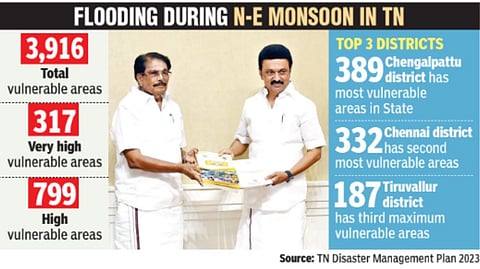

CHENNAI: Chief Minister MK Stalin on Friday unveiled the new State Disaster Management Policy and highlighted the need to slow down the extreme weather events by following climate change adaptation measures.
"There is a need to manage the onset of extreme weather events, frequency and intensity of natural disasters such as cyclones, floods and droughts. Climate Change Adaptation in the form of water saving crop husbandry, increasing the green cover that results in carbon sequestration will be scaled up," the policy said.
The government will devise a State Climate Action Plan and will also focus on mainstreaming disaster risk reduction and climate adaptation into development plans.
The State will also concentrate on capacity building of departments and local bodies, and exclusive capacity building programmes will be designed and imparted to line departments to ensure that the concept of mainstreaming disaster risk reduction becomes a practice.
The policy listed out ongoing projects and programmes that are being implemented by departments, which have scope to take up disaster risk reduction. Some of the projects listed by the policy document are establishing bio-shields, shelter belts to diffuse the intensity of cyclone winds and its impacts, land use regulations, floodplain regulations, regulation for coastal ecosystem, prevention of sea water incursion, periodical maintenance of river mouths and others.
Some of the objectives of the policy, as per the document, are to replace the existing approach of reactive relief by a proactive approach of mitigation and risk reduction, to develop a new culture of prevention, preparedness and quick response for management of disasters, to reduce the vulnerability of the community through proper risk assessment and essential measures of risk mitigation, to put institutions and structures in place for efficient and effective management of disasters and to identify and utilize the available resources efficiently.
The policy document noted that over the past century, over 50 cyclones have battered Tamil Nadu coast at various locations, posing a constant threat to people living in the coastal districts. Apart from the cyclones, other frequent disasters in the State are floods, landslides, droughts, sea erosion and sea water incursion, heat waves, thunderstorm and lightning, industrial and chemical disasters, fire accidents, forest fires and others.
Few pockets of the State are vulnerable to earthquakes and fall in Zone II and III. In addition to these the State is also vulnerable to health-related hazards, epidemic and pandemic prone diseases such as Chikungunya, Dengue, Covid-19 and other vector and waterborne diseases, it added.
Apart from highlighting the need for climate change adaptation and disaster risk reduction that are preventive measures, the policy also touches upon the topics such as disaster response and relief, recovery and reconstruction to be implemented after any disaster strikes.
Visit news.dtnext.in to explore our interactive epaper!
Download the DT Next app for more exciting features!
Click here for iOS
Click here for Android